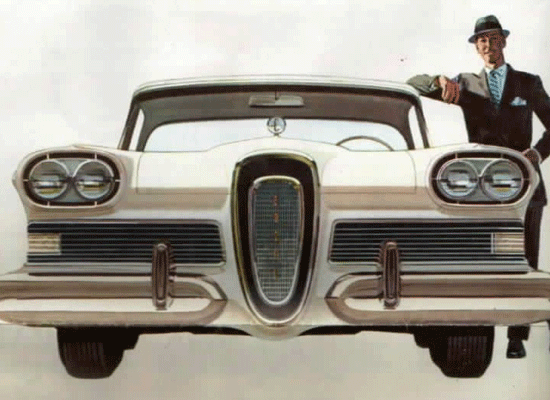A rose by any other name would smell as sweet, we have been told, and I believe, with some exceptions, that this is so. Did the infamous 1950s Ford flop, the Edsel, really fail because it was named for Henry’s son, or was it because the design was disappointing to mid-century Americans (even though it looks pretty good to me)? I think a car with a style that resonated with the public would have made “Edsel” synonymous with cherries rather than lemons. But branding has long been a field and namer an actual profession. In a New York Times Magazine article, the always-smart Neal Gabler takes us on a jaunt to find just the right name for a new virtual-reality product. An excerpt:
For decades, corporations have turned to creative people for their naming needs, with varying results. In 1955, a Ford Motor marketing executive recruited the modernist poet Marianne Moore to name the company’s new car. The marketing department had already created a list of 300 candidates, all of which, the executive confessed, were “characterized by an embarrassing pedestrianism.” Could the poet help? In a series of letters, Moore proposed dozens of notably nonpedestrian names — Intelligent Whale, Pastelogram, Mongoose Civique, Utopian Turtletop, Varsity Stroke — but the marketing team rejected them all, instead naming the new car (in one of the great disasters, naming and otherwise, in corporate history) after Henry Ford’s son, Edsel.
Today roughly 500,000 businesses open each month in the United States, and every one needs a name. From Dickens with his bitter Gradgrind to J. K. Rowling with her sour Voldemort, authors have long understood that names help establish character. Politicians know that calling a bill the USA Patriot Act makes it a little harder to vote against. The effects of strategic naming are all around us, once we begin to look for them. “You go to a restaurant, and you don’t order ‘dolphin fish,’ ” Shore points out. “You order ‘mahi-mahi.’ You don’t order ‘Patagonian toothfish.’ You order ‘Chilean sea bass.’ You don’t buy ‘prunes’ anymore; they’re now called ‘dried plums.’ ” Maria Cypher, the founder and director of the naming agency Catchword, which named the McDonald’s McBistro sandwich line, will tell you that names “give us a shared understanding of what something is.” Paola Norambuena, the executive director of verbal identity at Interbrand, says they give us a “shortcut to a good decision.”
Most people assume that companies name themselves and their products. True, Steve Jobs came up with the name for Apple and stuck with it despite the threat of a lawsuit from the Beatles, who had already claimed the name for their record label. Likewise, Richard Branson chose the name Virgin, and namers venerate him for it. “Virgin gets a reaction,” says Eli Altman, the head of A Hundred Monkeys, a naming agency. There is no “way that would get through a boardroom.” Most executives aren’t as imaginative as Jobs or Branson. And that’s where namers come in. Some work within larger branding agencies, like Landor or Interbrand. Others work within boutiques, like Catchword, A Hundred Monkeys (put 100 monkeys at 100 typewriters, and eventually they’ll write a Shakespearean tragedy, or a name), Namebase and Zinzin (French for “whatchamacallit”). Some, like Shore, are lone operators.
For the process that leads to a single name, companies can pay anywhere from $3,000 to $75,000.•
___________________________
The 1957 primetime TV show which introduced the Edsel, featuring Bing Crosby, Frank Sinatra, Louis Armstrong and Rosemary Clooney.

